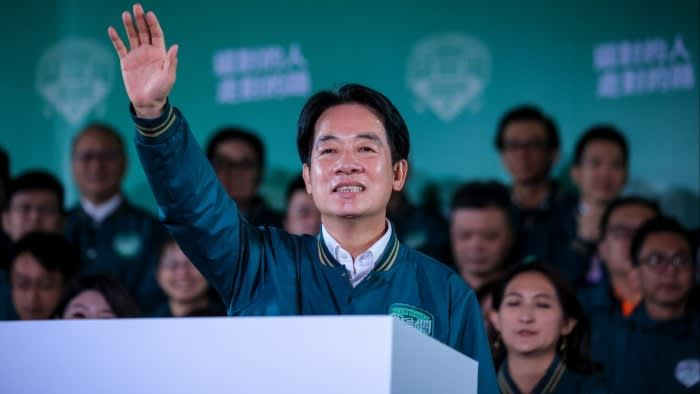Taiwan’s ruling party candidate wins presidential election

Access the Editor's Digest at no cost.
Roula Khalaf, who holds the position of Editor at the Financial Times, chooses her preferred tales for the newsletter that is distributed each week.
On Saturday, the Democratic Progressive party of Taiwan won an unprecedented third term in office despite China's warnings against electing their presidential candidate Lai Ching-te, whom Beijing has labeled as a dangerous separatist. Voters did not let China’s warning sway their decision.
The Central Election Commission has tallied over 90 percent of the votes and found that Lai has won 40 percent of them. Hou Yu-ih from the Kuomintang, an opposition party, has received 33.5 percent of the votes, and Ko Wen-je from the smaller Taiwan People's party has garnered 26.5 percent.
Despite the fact that the DPP is no longer the majority in parliament and Lai received over 17% less votes than President Tsai Ing-wen did during her reelection in 2020, the party managed to receive a larger portion of votes for their nationwide list of legislators-at-large than originally anticipated.
For the initial time in Taiwan's history of conducting independent and straight presidential polls in 1996, a political party has maintained power for more than two chunks of four-year terms.
The outcome may lead Beijing to increase the tension on its neighbouring democratic nation.
Lai has expressed that Taiwan supports democracy and opposes authoritarianism. He has announced to everyone that they will remain loyal to democracy and work together with other democratic countries.
He responded to Beijing's attempts to manipulate the election by saying, "We, the people of Taiwan, have the exclusive right to choose our president, and we have effectively resisted any external attempts to interfere in the process."
China believes that Taiwan is one of its territories and has no intentions of giving up its military option to take control if Taiwan continues rejecting reunification. The election was presented as a decision between conflict or harmony, with China urging the Taiwanese to choose wisely.
Before the elections, the People's Liberation Army cautioned that they are keeping a watchful eye and are ready to terminate any plans related to "Taiwan independence".
After winning, Lai issued a statement urging Beijing to improve communication and reduce tension. He expressed hope that both sides could engage in respectful and equal dialogue, rather than confrontational measures, in order to pursue positive exchanges with China.
He stated that during Tsai's time as leader, Taipei had refrained from causing any conflicts. He expressed his wish to preserve the principles of democracy and freedom. Additionally, he hopes that cross-strait relations will resume with a positive and structured dialogue in the future.
When the DPP rose to power in 2016, the Chinese government in Beijing disconnected from Taiwan's government. This decision was due to the fact that the DPP refused to acknowledge Taiwan as a part of China. However, the KMT believes that Taiwan is part of a larger Chinese nation, but disagrees with China's Communist party on which government properly represents it.
Ko mainly focused on attracting the votes of young swing voters by pledging tax reductions, bigger spending on healthcare and social welfare, and improving transparency in government. He scarcely delved into any extensive topics regarding China.
The initial information released by the Central Election Commission unveiled that the DPP obtained 36.2% of the vote for the legislative party list, which is 3% more compared to the results from last year. In 2020, Tsai achieved a record-breaking victory during her re-election campaign.
Lev Nachman, who is a political science expert at National Chengchi University in Taipei, stated that the party list vote reflects the genuine backing of people for the political parties. With these figures, it seems that the DPP has a better performance than was anticipated.
Experts mentioned that Lai might encounter a challenging tenure. It is likely that he will head the initial administration with a minority, causing potential obstacles over crucial matters such as boosting Taiwan’s defenses to prevent any possible Chinese aggression. This could result in frequent impasses and disagreements.
Lai mentioned that his upcoming government, commencing on May 20, will strive for harmony with the opposing party before executing any plans. Additionally, they will contemplate the possibility of inviting members from diverse parties into their administration.
He stated that the recent elections have indicated that individuals desire a capable administration and firm measures of scrutiny. He further emphasized that they acknowledge and honor this evolving public perspective.







































































